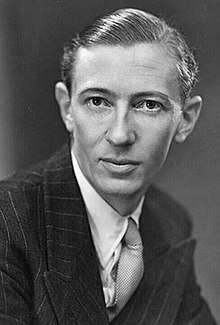Robert Carr
Leonard Robert Carr, Baron Carr of Hadley, PC (11 November 1916 – 17 February 2012) was a British Conservative politician who served as Home Secretary from 1972 to 1974.
The Lord Carr of Hadley | |
|---|---|
 Robert Carr | |
| Shadow Chancellor of the Exchequer | |
| In office 4 March 1974 – 11 February 1975 | |
| Leader | Edward Heath |
| Preceded by | Denis Healey |
| Succeeded by | Geoffrey Howe |
| Home Secretary | |
| In office 18 July 1972 – 4 March 1974 | |
| Prime Minister | Edward Heath |
| Preceded by | Reginald Maudling |
| Succeeded by | Roy Jenkins |
| In office 7 April 1972 – 5 November 1972 | |
| Prime Minister | Edward Heath |
| Preceded by | William Whitelaw |
| Succeeded by | Jim Prior |
| Secretary of State for Employment | |
| In office 20 June 1970 – 7 April 1972 | |
| Prime Minister | Edward Heath |
| Preceded by | Barbara Castle |
| Succeeded by | Maurice Macmillan |
| Member of Parliament for Carshalton | |
| In office 28 February 1974 – 15 January 1976 | |
| Preceded by | Walter Elliot |
| Succeeded by | Nigel Forman |
| Member of Parliament for Mitcham | |
| In office 23 February 1950 – 8 February 1974 | |
| Preceded by | Tom Braddock |
| Succeeded by | Constituency abolished |
| Member of the House of Lords Lord Temporal | |
| In office 15 January 1976 – 17 February 2012 Life peerage | |
| Personal details | |
| Born | Leonard Robert Carr 11 November 1916 |
| Died | 17 February 2012 (aged 95) |
| Nationality | British |
| Political party | Conservative |
| Children | 2 |
| Education | Westminster School |
| Alma mater | Gonville and Caius College, Cambridge |
Early life
Robert Carr was educated at Westminster School[1] and Gonville and Caius College, Cambridge, where he read Natural Sciences, graduating in 1938. After graduation he applied his knowledge of metallurgy at John Dale & Co, the family metal engineering firm.[1] A collapsed lung kept him from war service but his firm specialised in the construction of airframes for Lancaster bombers. [2]
Political career
He was elected Member of Parliament for Mitcham in 1950 and served there until 1974 when the seat was merged and he moved to Carshalton.
In Edward Heath's government he served as Secretary of State for Employment and was responsible for the modernising Industrial Relations Act 1971, which balanced the introduction of compensation for unfair dismissal with curbs on the freedom to strike and the virtual abolition of closed shop agreements. The Industrial Relations Act 1971 was deeply disliked by the trade unions whose industrial action lead to the three day week and ultimately to the defeat of the government. The victorious Labour Party promptly repealed the Industrial Relations Act, replacing it with their own Trade Union and Labour Relations Act 1974 which, while scrapping the "offensive" provisions, effectively re-enacted the remainder of Carr's 1971 Act.
In 1971, Carr escaped injury when The Angry Brigade anarchist group exploded two bombs outside his house.[3] More than thirty years later, a member of the group issued a public apology to Carr, and sent him a Christmas card.[4]
In 1972, Carr served a brief period as Lord President of the Council and was then appointed Home Secretary after the resignation of Reginald Maudling. After his defeat in the first ballot of the 1975 Conservative leadership contest, Edward Heath asked Carr to "take over the functions of leader" until a new leader was elected.[5]
Later life
Carr was created a life peer as Baron Carr of Hadley, of Monken Hadley, North London, in 1976.[6]
Death
Carr died 17 February 2012 at the age of 95 years. His body was buried in the graveyard of St. Peters Church, in the Gloucestershire village of Farmington. He was survived by his wife, Joan, and two daughters.[7]
References
- Goodman, Geoffrey (20 February 2012). "Lord Carr of Hadley obituary". The Guardian. Retrieved 24 February 2012.
- https://www.theguardian.com/politics/2012/feb/20/lord-carr-of-hadley
- "1971: British minister's home bombed". On This Day 1950–2005. BBC News. 6 December 1972. Retrieved 22 August 2011.
- Bright, Martin (3 February 2002). "Angry Brigade's bomb plot apology". The Observer. London. Retrieved 22 August 2011.
- The Times (59312). London. 5 February 1975. col A. Missing or empty
|title=(help) - "No. 46803". The London Gazette. 20 January 1976. p. 919.
- "Lord Carr of Hadley". The Daily Telegraph. 19 February 2012. Archived from the original on 19 April 2012. Retrieved 12 August 2013.
Bibliography
External links
- Hansard 1803–2005: contributions in Parliament by Robert Carr
| Parliament of the United Kingdom | ||
|---|---|---|
| Preceded by Tom Braddock |
Member of Parliament for Mitcham 1950–1974 |
Constituency abolished |
| Preceded by Walter Elliot |
Member of Parliament for Carshalton 1974–1976 |
Succeeded by Nigel Forman |
| Political offices | ||
| Preceded by Barbara Castle as Secretary of State for Employment and Productivity |
Secretary of State for Employment 1970–1972 |
Succeeded by Maurice Macmillan |
| Preceded by William Whitelaw |
Lord President of the Council 1972 |
Succeeded by James Prior |
| Leader of the House of Commons 1972 | ||
| Preceded by Reginald Maudling |
Home Secretary 1972–1974 |
Succeeded by Roy Jenkins |
.svg.png)